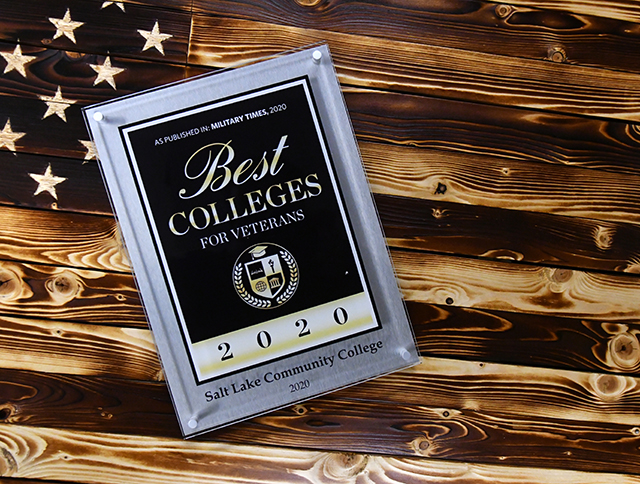July 25 marked National Hire a Veteran Day, a period that raises awareness of employment for transitioning U.S. servicemembers and veterans after completing their military service. Veterans bring competitive skills to jobs, like dedication, teamwork and good communication; yet, finding and competing for civilian positions can be challenging for transitioning veterans.
Many may not know of Salt Lake Community College’s longstanding history with student veterans. In 1948, the Salt Lake Area Vocational School expanded its educational programs and resources financed by the Montgomery GI Bill. Today, SLCC serves approximately 1,100 veterans and is ranked 16 on the Military Times Best for Vets: Colleges 2020 as a two-year college.
Career Services is the perfect one-stop-shop out of the many job readiness resources Salt Lake Community College offers student veterans. Career coaches can meet with students and help them map their professional needs. Career Coach Dan Hooten says an integral part of his process in career coaching all students, including veterans, is personalization. "I'm seeing who they [the student] are as a person and getting to know them as a human being, outside of just the uniform they wore," Dan says. "A lot of our students—particularly our veteran students—get done [at SLCC], and then they don't know where to go. They've been in such a structured world for so long, and then they either want that structure back or don't know. Or they're like, 'I'm free. I can do what I want, but I don't know what I want to do.'"
Identify Your Interests and Personal Preferences
Dan shares that all students visit Career Services at various stages in their program but most visit at the beginning of their studies to look for employment or post-graduation to ask for resources. When meeting with student veterans, Dan asks them to consider what they are interested in and want out of a career. An important part of career exploration—learning about occupations and how they may or may not fit someone's unique career preferences—is considering a student veteran's lifestyle preferences, like a desired work-life balance or a high salary. “We talk about if this job will match the lifestyle they want to have right now,” Dan says.
Find the Perfect Job
When it comes to job searching, Dan says an important factor is knowing where to search. Career Services uses Handshake, an online platform that helps students find jobs. Handshake allows employers to include candidate preferences and what applicants they prioritize in a job post. "I always make sure—at least for our student veterans—to look and read through the description," Dan says. "They [employer] may be looking for veterans because the hiring manager or the HR people are veterans. So, they want to make veterans of priority."
Develop Your Network
Another way to garner attention from employers is networking. Dan shares that he instills networking skills in all students and that “whatever groups [a student] align with” is their network. Networking, Dan says, is not only about making connections but also allows to promote their skills and traits and share their professional goals with employers. "So often, students leave all this stuff and their desires in," Dan says. "We always tell them, 'No talk about it. Speak up about it.' It doesn't matter whether you're working a front desk job, fast food, or working opposite from where you want to go. Say, 'This is what I'm doing now. But this is where I want to go.'"
Attend a Job Fair
One way student veterans can network in person is through Career Services' Job Fair. The office hosts two annual fairs during the spring and fall semesters. The event allows students to meet with and talk to employers from various industries.
"We always say, 'Go to those job fairs, because that's where the hiring managers are," Dan says. "Those are the people you can make an impression on, who you can hand your resume."
Career Coaches are Your Advocates
SLCC career coaches can also advocate for their students by reaching out to companies. “If there are companies that they're interested in, but they don't know who to talk to, we can be an advocate for them and reach out to those particular companies,” Dan says. Coaches can ask employers if they have positions available for students within their company.
Dan works with veterans who represent all different career stages. “Remember, you are not stuck,” he says encouragingly. “Reach out to us for help no matter what stage you are at in your professional career.”
Contact
For more information, visit the Career Services webpage or follow the office on Instagram (@slcc_careerservices). Students can schedule an appointment to meet with a career coach in-person, virtually, or via telephone.





Comments
Post a Comment